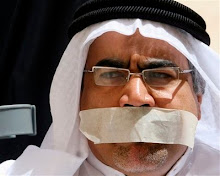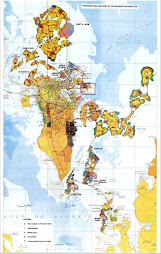HAQ: Movement of Liberties and Democracy- Bahrain
حق: حركة الحريات والدموقراطية- البحرين
مكتب حقوق الإنسان ..Human Rights Bureau
www.haaq.org, Email: HAAQ.Bahrain@gmail.com
Three Bahrainis Prosecuted for Graffiti writings
حق: حركة الحريات والدموقراطية- البحرين
مكتب حقوق الإنسان ..Human Rights Bureau
www.haaq.org, Email: HAAQ.Bahrain@gmail.com
Three Bahrainis Prosecuted for Graffiti writings
The Human Rights Bureau of the HAQ Movements expresses is serious concerns to the deterioration of public freedom of expression in Bahrain. It has been learnt that Abdulla Abdulkarim Abdulla Al-Fardan (27yrs) from the village of Karzakan (20 km southwest of the capital Manama) was summoned to the Public Prosecution to find himself accused of writing slogans and graffiti on the walls of his village. Abdulla Al-Fardan, married and a father of a child, has been detained for a week starting Sunday 21March 2010, pending further investigation.
Faced with the same charges, two young men from the village of A'ali (About 12km to the south of Manama) were also detained from their houses at dawn time on last Thursday 18 March 2010. The Public Prosecution decided to apprehend Amer Hasan Ebrahim (14yrs) and Ali Abdulla Salman (20yrs) for charges of being involved in writing graffiti in A'ali.
Due to the fierce grip on the media and expression outlets, graffiti and wall slogans are ways of expression by the protestors and posting messages and publications for events and postures in Bahrain. Graffiti have been
clear marks of protests in villages and areas of resentment to State policies and programs, during the protests in the nineties and people in Bahrain very well appreciate it. The slogans cover issues of the constitution and democratic reforms, poverty and economical rights, political naturalizations and change of demography plan, discrimination, corruption and favouritism. They also cover criticism to the ruling elite and the government as well as express supports and glory to popular figures and religious leaders, portraying their photos and martyrs in Bahrain on the wall. The activity of "graffiting", usually carried out late in the night away from any observation, is followed the second day or few days later by white wash by members of the Ministry of Interior. It is easily observed the numerous layers of graffiti resulted from the repeated writing and washing processes leading to scrambled texts and obscured portrays and slogans on walls of many villages.
The Authorities, therefore, considers writing graffiti and slogans of "subversive" nature (All topics related to public affairs are considered subversive when spelled over the wall). The Bahraini law punishes severely the exercise of graffiti as it considers part of provocation, inciting hatred to the Government and the regime, if not an attempt of overthrowing them. The Bahraini law considers "text, portrays and images" part of publicity means, as stated in Article 92 of the Penal Code of 1976, and practicing it to criticize ruling and governmental officials, discredit public establishments, incite hatred, promote law disobedience etc are punishable by the Penal Code.
It is obvious that detention of the three men on charges of writing of graffiti is grave violation of their basic citizen and human rights, particularly Article 19 of the ICCPR which states that:" 1. Everyone shall have the right to hold opinions without interference. 2. Everyone shall have the right to freedom of expression; this right shall include freedom to seek, receive and impart information and ideas of all kinds, regardless of frontiers, either orally, in writing or in print, in the form of art, or through any other media of his choice".
It is to be mentioned that Bahrain acceded the ICCPR in September 2006 and should respect its universal obligation to this covenant and other human rights charter, especially with regards to freedom of expression. Haq, therefore, calls for:
1- The immediate release of the three men (Abdulla Abdulkarim Al-Fardan, Amer Ebrahim and Ali Abdulla Salman) without any reprisals or penalties towards any form of expression, if they had carried it out.
2- The amendments of the Bahraini laws to conform to the international human rights covenants and standards.
March 21, 2010.







